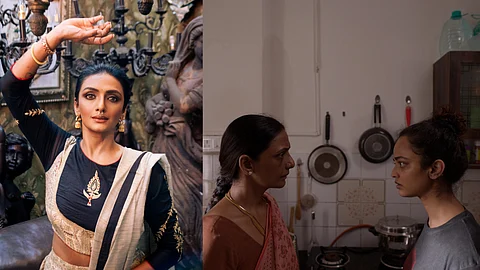

It has been 31 years since actor Shanthi Priya was seen on the big screen. Her last onscreen appearance was in Akshay Kumar's 1994 film Ikke Pe Ikka, but for the Tamil audience, her absence has been even longer, as she last made a notable appearance in Vijayakanth's Sirayil Pootha Chinna Malar (1990) before she moved to Bollywood. Despite a world of changes around her, Shanthi Priya says she felt like having returned to her ‘porandha veedu’ when she worked in Varsha Bharath's upcoming film Bad Girl. She was working on OTT projects like Dharavi Bank (2022) when the stars aligned and she received a call from Varsha to play debutant Anjali Sivaraman's mother in the film. "When Varsha told me that it’s Vetri Maaran's production, I grabbed it immediately. But I was sceptical when she asked me for my pictures without makeup. While my sister (Bhanupriya) started pivoting to natural makeup in the later stages of her career, I hadn’t moved to playing roles without any makeup. I wasn't confident,” she explains. Half an hour and a few photo messages later, Varsha knew Shanthi Priya fit the picture perfectly.
In many ways, Shanthi Priya is a 'bad girl' herself—living her life by her own terms and even recently choosing to go bald. "Yes, I am a proud bad girl," she laughs, adding, "Everyone says my sister is silent, and I am the naughty brat. I won’t exactly call myself a rebel, but I’ve always stood my ground when I wanted to achieve something.” But how does she deal with the contradictory nature of her character in Bad Girl, a patriarchal mother, versus herself? “Despite these limitations, my character understands that Anjali’s character needs wider exposure than herself and wants to provide every opportunity that she didn’t have access to,” says Shanthi Priya, noting that her role allowed for a lot of self-reflection. “I saw my mom in my role, and myself in Anjali,” she adds.
Playing challenging roles was not uncommon for Shanthi as she was known for her experimentation in films like Saugandh (1991), Sigappu Thali (1988) and Mere Sajana Saath Nibhana (1992) that challenged gender norms. “Despite working in multiple industries, nothing gave me fame like Enga Ooru Pattukaran (1987) did. I played an innocent girl in that film. After that, in Sakkarai Panthal (1988), I had a dual role, and then in my Hindi films like Saugandh and Phool Aur Angaar (1993), my characters were etched out uniquely,” points out Shanthi Priya.
She was one of the few actors in the 80s and 90s to enjoy a pan-India presence, and not only juggled multiple industries, but found fame in all of them. “There was a belief in the 80s and 90s that if actors worked in televison, they would not break into films, and vice versa. However, my akka and I worked in the Tamil and Telugu industries and still managed to earn the spotlight through the TV series, Vishwamitra (1989). Both of us worked in every language seamlessly,” she recalls. While Shanthi considers herself “blessed” to have avoided being typecast, she notes a common misconception: “People often equate South Indians with just Tamilians. I constantly explain that there are four major languages here and that I am Telugu.” That said, she adds with a smile, “One good thing is that South Indians are seen as disciplined, punctual, and consistent. We’ve earned that reputation across the North belt.”
That same confidence in representation extends to her latest film, Bad Girl, whose teaser was recently removed following a Madras High Court order. Shanthi expresses shock, but assures that the film tells the story of every young person trying to understand life. “I feel people are misjudging the film even before its release. Varsha didn’t want to sugarcoat it as a regular family drama—she put her heart into promoting it honestly. After watching the film, I’m sure even parents will relate to it. I’m a mother too. The film doesn’t disrespect any caste or religion; it simply tells the story of every young person trying to figure out life.”
With cinema evolving at a great pace, there is no doubt that Shanthi Priya returned to a world that is completely different from when she left it. Sharing her belief that the storytelling and soul of cinema have remained the same, she says, “What has changed is the canvas of the story. The medium has become faster, and pictures are sharper. The world has now become the audience. Earlier, we never had mics with us, and scenes were given on the spot. Now, there is intensive training for every aspect, including perfecting language and dialect. Every filmmaker is now bringing in unconventional stories to the forefront. There were a lot of inhibitions back then, and questions were raised about whether the audience would like a particular story or not. But now, everyone is craving for unseen and untold stories. Audiences are smart and cannot be cheated now.”
As she embraces her second innings in cinema, Shanthi Priya is clear about wanting to break out of the conventional mould. “I don’t want to be limited to just mother roles,” she says, adding, “I want to play a negative character, don a police or a military uniform. I want to explore it all. But most importantly, I don’t want to be just a prop in any film. I am not worried about my screentime, but my roles should hold a deep meaning in the film.”
After being in Mumbai for 30 years, Shanthi is ready to make a memorable comeback, and this time, she is here to stay. “There is no looking back. I am ready to pack my bags and head to Chennai,” says Shanthi excitedly, before signing off.